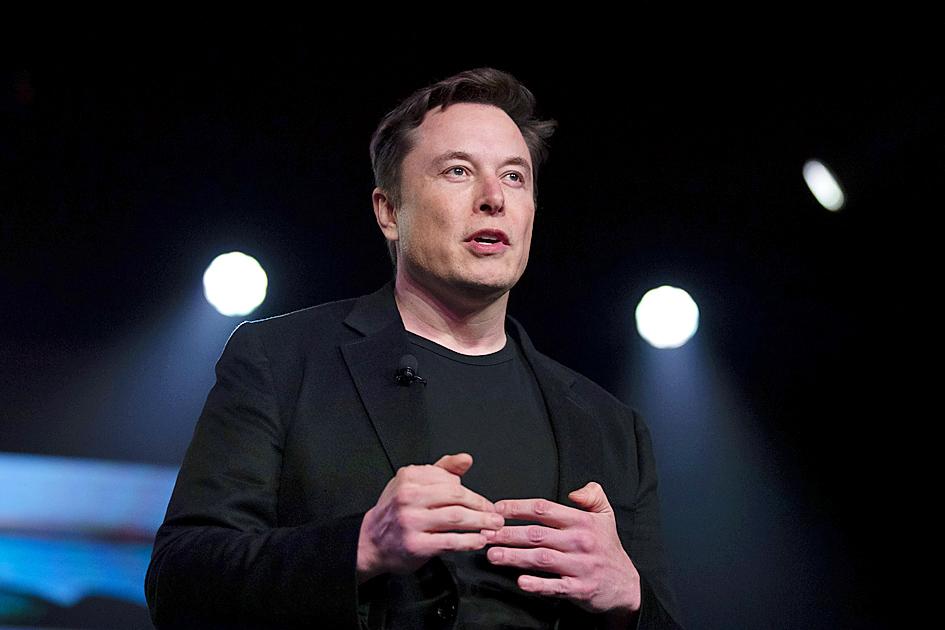A double whammy of a global shortage of chips and ships is the only thing standing in the way of Tesla Inc maintaining sales growth in excess of 50 percent, according to CEO Elon Musk.
“We’ve had a fantastic year, we had record vehicle deliveries,” Musk told Tesla’s annual shareholder meeting in Austin, Texas, on Thursday. “It looks like we have a good chance of maintaining that. Basically, if we can get the chips, we can do it. Hopefully this chip shortage will alleviate soon but I feel confident of being able to maintain something like at least above 50 percent for quite a while.”
While the chip shortage has dominated auto-industry headlines this year, Musk said the electric-car maker was grappling with “lots” of supply chain challenges.

Photo: AP
“One of the biggest challenges we had in Q3 was, can we get enough ships,” he said, referring to a backlog of cargo ships that has been occurring for much of the year.
The chip shortage does not appear to be slowing Tesla just yet. The company earlier this week reported record deliveries of 241,300 cars worldwide in the third quarter, beating the previous high of 201,250 vehicles in the second quarter.
Tesla’s numbers compare favorably with the rest of the auto industry, which saw US vehicle sales slump in the latest three-month period due to limits on production from supply chain shortages. General Motors Co took the biggest blow, with sales in its home market dropping by a third in the latest quarter.
Musk said the “significant cost pressure” in the supply chain had forced Tesla to increase vehicle prices, at least temporarily.
“The sheer amount of money we’re spending on flying parts around the world isn’t great,” Musk said.
It could be at least 12 months before the situation starts to improve.
“We should be through our severe supply chain shortages in [2023],” he said. “I’m optimistic that will be the case.”
Tesla said it is moving its corporate headquarters to Austin, Texas, where a new factory for the Model Y and forthcoming Cybertruck is nearing completion, relocating from California after 18 years.
Musk announced the move at the Austin plant on Thursday during Tesla’s shareholders’ meeting.
Tesla is the latest California-based company to move to Texas, which has lower taxes, a lower cost of living and fewer business regulations. Hewlett Packard Enterprise Co shifted its base to Houston, and Charles Schwab Corp moved its headquarters to the Dallas area from San Francisco.
The carmaker joins a number of other tech companies with operations in Austin. Dell Technologies was founded in the city, and Apple Inc and Facebook Inc have a large presence there.

In Italy’s storied gold-making hubs, jewelers are reworking their designs to trim gold content as they race to blunt the effect of record prices and appeal to shoppers watching their budgets. Gold prices hit a record high on Thursday, surging near US$5,600 an ounce, more than double a year ago as geopolitical concerns and jitters over trade pushed investors toward the safe-haven asset. The rally is putting undue pressure on small artisans as they face mounting demands from customers, including international brands, to produce cheaper items, from signature pieces to wedding rings, according to interviews with four independent jewelers in Italy’s main

Japanese Prime Minister Sanae Takaichi has talked up the benefits of a weaker yen in a campaign speech, adopting a tone at odds with her finance ministry, which has refused to rule out any options to counter excessive foreign exchange volatility. Takaichi later softened her stance, saying she did not have a preference for the yen’s direction. “People say the weak yen is bad right now, but for export industries, it’s a major opportunity,” Takaichi said on Saturday at a rally for Liberal Democratic Party candidate Daishiro Yamagiwa in Kanagawa Prefecture ahead of a snap election on Sunday. “Whether it’s selling food or

CONCERNS: Tech companies investing in AI businesses that purchase their products have raised questions among investors that they are artificially propping up demand Nvidia Corp chief executive officer Jensen Huang (黃仁勳) on Saturday said that the company would be participating in OpenAI’s latest funding round, describing it as potentially “the largest investment we’ve ever made.” “We will invest a great deal of money,” Huang told reporters while visiting Taipei. “I believe in OpenAI. The work that they do is incredible. They’re one of the most consequential companies of our time.” Huang did not say exactly how much Nvidia might contribute, but described the investment as “huge.” “Let Sam announce how much he’s going to raise — it’s for him to decide,” Huang said, referring to OpenAI

The global server market is expected to grow 12.8 percent annually this year, with artificial intelligence (AI) servers projected to account for 16.5 percent, driven by continued investment in AI infrastructure by major cloud service providers (CSPs), market researcher TrendForce Corp (集邦科技) said yesterday. Global AI server shipments this year are expected to increase 28 percent year-on-year to more than 2.7 million units, driven by sustained demand from CSPs and government sovereign cloud projects, TrendForce analyst Frank Kung (龔明德) told the Taipei Times. Demand for GPU-based AI servers, including Nvidia Corp’s GB and Vera Rubin rack systems, is expected to remain high,